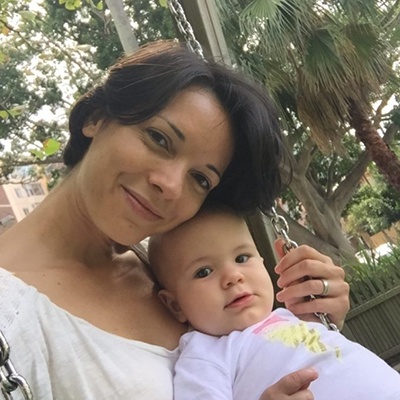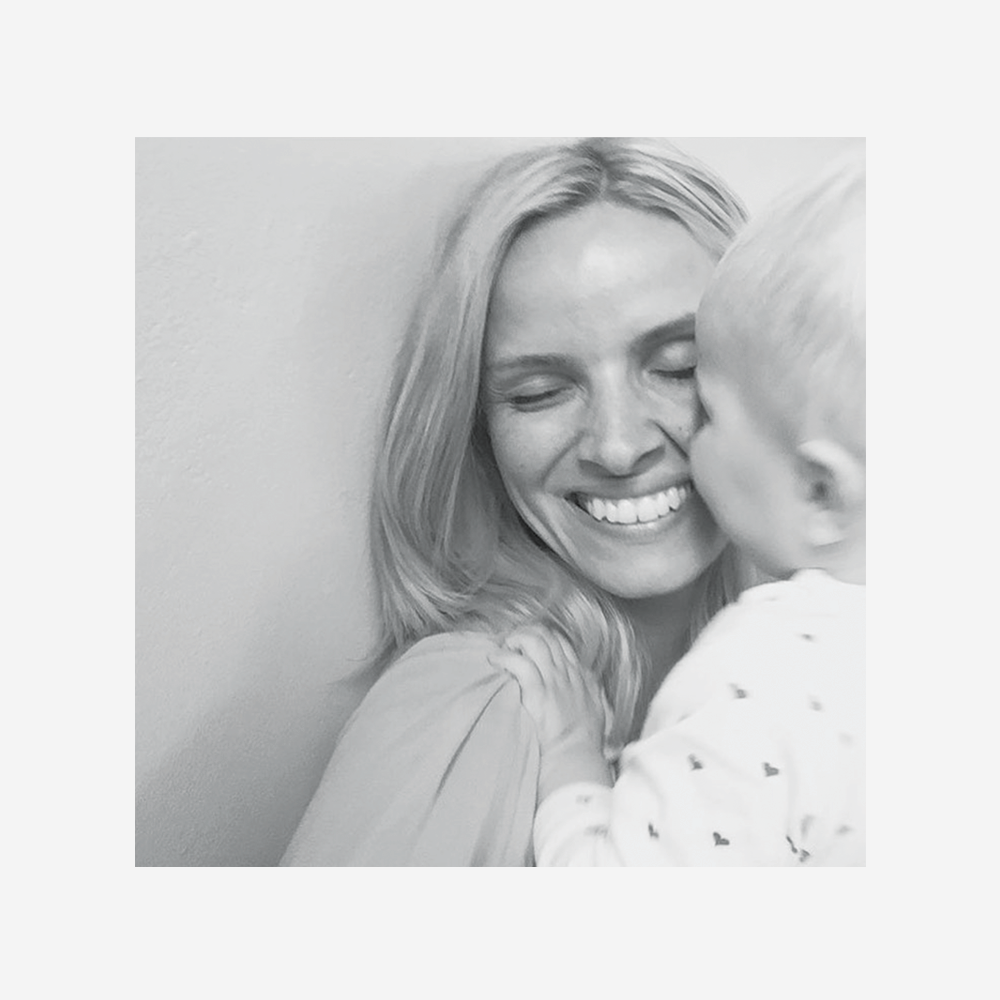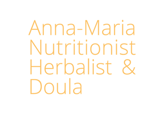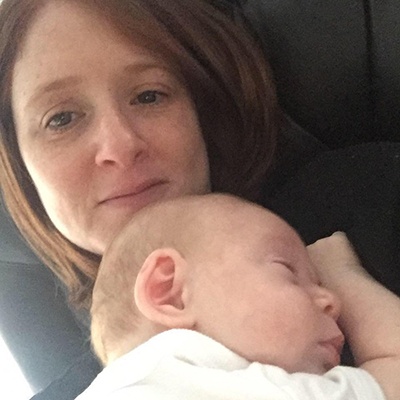This blog post will take you through your baby's first foods and the stages of introducing the different foods to your baby. I truly hope you feel well equipped to offer your baby the best start in life and help them build a strong and happy relationship with food!
This is a very special time in a child's life when you consider their health and long-term relationship with food. We as parents are the facilitators of our child’s genetic setup; from the womb - to the milk - to the dinner plate, we set up our children for life.
I consider this one of the most important pieces of information I can offer you to help you give your child the best start in life. What happens in the womb is your baby's genetic setup, and what we feed them is the gateway to health or disease. Of course, we want to choose health!
I have been presenting "Baby's First Foods - A Guide To Starting Solids" as a live event for over six years and have now transformed into a more comprehensive and detailed webinar through this blog post so you can read and listen to the information when it suits you best (probably during baby's nap time right!?) and in the comfort of your own home. I have also accumulated even more information and detail into this webinar, so you are guaranteed to have all the tools you need to provide your baby with everything he/she needs and be confident and relaxed as this first major transition in your baby's life unfolds.
Is your baby ready for solid food? Please remember; I recommend introducing your baby's first foods at 6 months, nevertheless some babies may be ready for solids prior to 6 months. One of the most common questions I get is "how do I know my baby is ready for solid food?".
With this course about your baby's first foods you will know how to:
- Gauge when your baby is ready for solid food.
- Address your baby's genetic predisposition and how to tailor the foods accordingly.
- Be confident and worry-free.
- Create a healthy environment for a lifelong emotionally sound relationship with food.
- Understand your baby's emotions and challenges around starting solids.
- Recognise any sudden food reactions and intolerances.
- Minimise your child's chances of allergies later in life.
- Make your own nutritious baby food, save time & money.
- Reconnect with your own invaluable mother instincts rather than get highjacked by marketing and commercial baby products.
- Adjust your baby's foods during vaccination times and other immune changes.
- Minimise the chances of a fussy eater when your baby is reaching toddler and school years
The signs to look for if your baby is ready for the first foods:
- Able to sit on their own, hold neck steadily
- No tongue reflex
- Engaging and observing you when you are eating and preparing foods
If you have any doubt about your baby’s readiness please get in touch with me, a Skype or Face-Time consultation can allow me to assess your baby easily – to set up a Face-Time or Skype session simply: Book A Consultation
Foods to give to your baby by age:
5-6 Months Old Baby
- Start with a semi soft semi hard-boiled egg yolk (please wait with the egg white till after your baby has turned one. (This is only ok if there is no family history of egg allergy)
- Pumpkin, sweet potato, swede, green apple. Great steamed and mashed to a smooth consistency with a fork, At this early stage adding milk (breast or formula is great)
6-8 Months Old Baby
Offer your baby the breast milk or formula before meals as the milk is still more important than the food at this stage.
- Puree lamb with the fat, beef, chicken and fish. Or serve it after slow cooking it so it is very mushy. Letting your baby gnaw on a lamb chop is also great!
- Cooked zucchini, squash, carrots, potatoes, carrots, sweet potatoes are excellent first choices and mixed with breast milk/formula or chicken broth. All vegetables should be cooked (steamed preferably)
- Avocado, melon, mangoes and papaya can be mashed and given raw
- Fruits can be added in the following order: Steamed apple, pear, peaches and apricots. Berries are also ok, just keep in mind non-organic fruits can be highly sprayed, and therefor ideally go for non-sprayed produce.
8-9 Months Old Baby
- Offer your baby the breast milk or formula after meals as the food is slowly becoming more important than the milk at this stage.
- It is very important that the food is now offered with great texture. You can offer flakes of fish and cubes or strips of meat. Please avoid pureeing the food now.
- Now you can introduce coconut oil and organic butter to puree/mash. This will increase the fat-soluble nutrients that are not readily available in vegetables.
- High-pectin fruits such as peaches, apricots, apples, pears, cherries and berries should be cooked to break down the pectin, which can be very irritating to the digestive tract
- Steamed spinach and other leafy greens are best to introduce after 10 months.
12+ Months Old Baby
- This is a good time to introduce yogurt’s, however, goat yogurt can be introduced before. Goat and sheep are the more nutrient-dense options.
- You can also offer the whole egg, further introduce meat of all kinds and grated frozen liver (on top of his favorite puree/mash) is the best way to ensure baby gets his/her iron. I know this might be a surprise to you, but it’s a very traditional food around the first birthday.
- Liver must be from a grass fed (young) animal. The best way is desiccated frozen liver perhaps on an egg. Liver provides the best range of minerals that he needs at this stage and is easier for him to absorb this way. Do not, however, use an non-organic liver.
- If you at any stage feel your baby is getting a low immune or struggling with seasonal changes you can supplement his diet with cod-liver oil. It works wonders for children and is packed full of vitamin A, D and good fats. ½ tsp. with food (mixed well) you can buy it here. Or feel free to book a phone consultation with me so I can assist you further
- I strongly recommend (after doing good research in this area) waiting till your baby is 12 months old to give grains. When you introduce grains they need to be well soaked and prepared. This includes all baby cereals. The best is to introduce oats after having soaked them in water overnight with a few drops of apple cider vinegar – the vinegar can be optional… but gives a better result. Then offer it as porridge with a tsp. of organic butter and perhaps a poached pear or apple. The same goes for the other grains; they should be soaked and cooked toughly.
Chicken soup/bone broths are fantastic for baby's first foods and as the base for your purees. After approximately 8 months you can even offer it on its own as a lukewarm drink. I suggest making your own and freezing them in an ice-cube tray, handy serve size for each meal. Get the bone broth recipe here.
Strategy for a successful start with your baby's first foods
- Please always consider grass-fed meat, Organic chicken when possible & pesticide-free vegetables and fruits.
- Your baby is not absorbing that much of the actual nutrients (mostly the fat-soluble) in the first year, I usually explain this as the time where your baby ‘builds a relationship to food’ Let this be a fun time to touch, smell, taste … drool, spit and smother the food. Your baby is getting most of what is needed from breast milk or formula. After 12+ months your baby’s gut is getting stronger and will be absorbing more and more.
- Children need high levels of fat throughout growth and development. Milk and animal fats give energy and also help children build muscle and bone. In addition, the animal fats provide vitamins A and D necessary for protein and mineral absorption, normal growth and hormone production.
- Choose a variety of foods so your child gets a range of fats, but emphasize stable saturated fats, found in grass-fed meats and coconut oil, as well as monounsaturated fats, found in avocados.
Things to be aware of when introducing solids foods to your baby
Signs of intolerance: include redness around the mouth; abdominal bloating, gas and distension; irritability, fussiness, over-activity and awaking throughout the night; constipation and explosive poos; frequent regurgitation of foods; nasal and/or chest congestion; and red inflamed eczema-like skin rash.
A note on Eggs: Egg yolks, rich in choline, cholesterol and other brain-nourishing substances, can be added to your baby's diet as early as four months, as long as baby takes it easily. (If your baby reacts poorly to egg yolk, discontinue and try again one month later).
How to go about giving meat to your baby: Cook meat gently in filtered water or homemade stock until completely tender, or use meat from stews, that you have made for your family dinner. Make sure the cooked meat is cold and is no bigger than 1-2 cm (chunks). Grind up the meat first until it's almost like a clumpy powder. (This is for 5-7 months) Later the cubes are a better option. Use, formula or breast milk, broth or the natural cooking juices as the liquid so it has a juicy consistency and isn’t too dry.
Here's what you need to avoid for your baby's first foods
- Certain foods, such as spinach, celery, lettuce, radishes, beets, turnips and collard greens, may contain excessive nitrate, which can be converted into nitrite (an undesirable substance) in the stomach. These foods can be introduced, one by one, after 9 months.
- Citrus and tomato, which are common allergens and should not be offered until 9-10 months. Ideally alongside breast milk, if you are still offering your baby that.
- Diary, especially cow’s dairy, can block the absorption of Iron so I recommend it is introduced later around 10 months. There is no harm in trying earlier but if you are formula or breastfeeding then there is no rush in introducing the dairy products. Dairy, as I have mentioned, is also best if it is from sheep or goats.
- Honey, egg white, nuts, seeds & grains until the 12 months mark.
A Little About Me, The Creator of "Baby's First Foods - A Guide To Starting Solids":
I am a mother of 3 girls. I have worked with children for more than 6 years and I am continuously staying up to date with the latest research on Paediatric nutrition. With my clinical and personal experience, I have created this comprehensive online course to help you feel confident and know how to support your baby the best! It truly makes a difference when you feed your baby the right foods and don't fall into the many fads and food marketing traps that can be so very hard to navigate through.
I help you understand what foods to start with and which foods come later. I educate you on how the food impacts your baby and how you can use food to strengthen their child’s immune and digestive system from the very beginning. I also clarify why some foods are important to avoid and why there are foods that are best to start with and why some need to come later. I wholeheartedly believe this is a time to really pay attention to how you help your baby connect, bond, and feel about food. You can do your baby a lot of good by considering your family history of illness, intolerances, and allergies, and the way you birthed your baby is also a very important factor here. Starting your baby on solids – the right way – can help minimise or eliminate allergies and intolerances that run in your family. Most importantly, it sets your baby up with a much more resilient foundation for his/her health and wellbeing.
Your baby's first foods and all the factors mentioned really define the foundation of your baby’s health – the platform on which they will build their long wonderful lives. Start right, and the rest will be effortless.
As all babies are different this guide of your baby's first foods is for general recommendations only. I do not have you or your baby in front of me, so please follow my guidelines and always seek further advice if you have any questions, concerns or if your baby has been unwell or is taking medication – an email is always welcome: annamaria@annamaria.com.au, I’d love to hear from you.
What Mothers Think Of "Baby's First Foods - A Guide To Starting Solids
![]()

This course gave me all the information I needed to feel confident about starting solids with my baby. I loved the fact that it was short and simple to follow, and gave explanations as to why certain foods should be introduced at different times. It's so handy to have the pdf document as a support that I can go back to anytime. Thank you for putting together such an informative and easy to follow guide
- Elise, mum to baby Camille.
This was very helpful and informative. I felt well informed and relaxed about everything when at the end. What i found most interesting was the foods to introduce. It's a lot easier than I thought. I recommend Anna-Maria's talk on solids! She made me feel very at ease and well informed. I feel more comfortable now. I was a little anxious before the talk but now I am a lot more relaxed about it. Thank you very much - It was amazing!
- Karen, mum to baby Chloe Rose.
Anna-Maria's Starting Solids online course was extremely useful. I loved the way she presented information in a way that was easy to digest but still provided the reasons for her suggestions so I could run it past my own "does-it-apply-to-me-ometer". The length of the course was perfect for busy mums to get started. I will be recommending it to other mums for sure!
- Kelly, mum of one.

Get A Free Gift
My Top 10 Foods for a Happier Healthier Mum
As a fellow mum (of three wonderful girls) I really know how challenging and exhausting being a mum can be at times!
When I first became a mum I realised just how much my lifestyle and diet played a part in how well I coped with the demanding tasks of caring for my little ones.
I help so many women through all kinds of burnout, exhaustion, weight gain, digestive and hormone problems, illness and general low's.... and I never get tired of seeing just how well they respond to my graspable and nurturing support. It really makes my job such a blessing, to be able to help you.
Alright, let's get to it! Here are my top 10 tips to become a happier and healthier mum!




